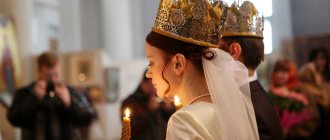The meaning of weddings in the Orthodox and Catholic churches
In the Christian tradition, a wedding represents the blessing of the Lord on a new family. But the ceremonial canons in the Catholic and Orthodox faiths are characterized by both commonality and differences.
Catholic weddings adhere to a more tolerant policy towards people of other religions. It is allowed to conduct a ceremony between a Catholic and a person belonging to a different faith. Children born in such a union must be raised in the Catholic tradition: this is supported by a written contract. If the agreement is violated, the marriage must be dissolved. The Orthodox Church allows the ceremony only between Christians.
A second wedding is permissible if the partner has passed away or the couple has separated due to infidelity. A practicing Catholic can schedule a ceremony only once with a person who has not previously been married (in any church).
For the Orthodox rite, the presence of wedding rings is important, while for the Catholic rite this attribute is optional. The difference also lies in the time allowed for the ceremony. Catholic weddings can take place on any day. But, if the date of the ceremony falls during Lent, it is recommended to postpone the celebration. In Orthodoxy, couples cannot be married during any fast.
Parishioners of a Catholic church cannot get married without officially registering the marriage at the registry office. Exceptions in this matter are allowed in Orthodoxy.
Both Catholic and Orthodox movements provide for stability in a married marriage and fidelity to the other half.
A married couple should actively participate in church life, attend services, periodically go to confession, and raise children in the Christian tradition.
On the origin of marriage and the emergence of the wedding ceremony
Initially, marriage was considered a union of a man and a woman, recognized in society. There were no special prayers for the blessing of a marriage in the first centuries of Christianity. The new Christians who were baptized accepted with full responsibility the commandment “thou shalt not commit adultery” and the apostle’s call to the immaculate life of spouses: “Let marriage be honorable for all and the bed undefiled; But God judges fornicators and adulterers” (Heb. 13:4). Awareness of this commandment encouraged Christians to build family life in unanimity and chastity.
The earliest mention of the participation of the Church in concluding a marriage is found in St. Ignatius the God-Bearer, he writes: “Those who marry and are given in marriage should enter into a union
with the knowledge of
the bishop
, so that the marriage is about the Lord." However, apparently, at that time this was more a local than a universal rule.
Later, the presence of a clergyman at the wedding feast was considered a sign of the blessing of the marriage union. There is evidence that during the time of St. John Chrysostom, the clergy read a prayer for the blessing of marriage. Even then, the marriage ceremony was still a kind of civil act and was carried out according to the tradition of the society in which the Christian spouses lived.
Worldly entertainment at a wedding did not always turn out to be compatible with the requirements of Christian piety, however, even when marrying Christians, not everyone could not always refuse them. Therefore, there was a need to distinguish between the secular part of the wedding celebration and the church part, while the latter was given clear preference. For blessings, spouses began to come to church, and the church ceremony was finally separated from the secular one, becoming a wedding rite in the 4th–6th centuries.
The name “wedding” comes from the word crown. The crown has been a wedding symbol since before the advent of Christianity. The crown as a symbol of victory over the flesh is found in the works of Chrysostom: “They (the young) have crowns placed on their heads, for they are not conquered and follow to the marriage bed, not being conquered by lust. If someone, being a slave of lust, gives himself over to harlots, then how can he also receive a crown on his head, being conquered?”
Wedding in a church without registration in the registry office: is it possible?
The wedding ritual has a deep sacred meaning for believers. Each of the newlyweds bares their soul before their future spouse and the Lord. The union is recognized not only in earthly life, but also in heaven.
Why do newlyweds need this?
It is important that those wishing to enter into a church marriage strive to do this not only for the sake of a romantic, beautiful ceremony. The ceremony implies a willingness to make sacrifices for the sake of a loved one, to be absolutely devoted to him.
Married spouses do not allow anger and violence towards each other, manifestations of jealousy and other passions. Peace and mutual understanding reign within the couple, Christian commandments are respected, and children are raised by the rules of the church.
But the ritual itself does not guarantee a prosperous life together, family happiness. Partners take joint responsibility for the preservation of the marriage before God.
A wedding without or with marriage registration only helps to realize the importance of the decision being made.
Is registration required?
The wedding ceremony is held only after a secular marriage. The procedure involves signing at the registry office, and the newlyweds receive the appropriate mark in their passport. The common expression “civil marriage” implies partners living together without registration. This type of relationship is condemned by the church and is considered fornication.
Are there any exceptions
The Church allows some deviations from the norms. You can get married without official registration:
- If a secular wedding is scheduled for the same date, but later. In this case, it is necessary to provide the priest with an invitation to register at the registry office, where the names of the spouses are indicated.
- If the lovers are obedient parishioners, the rector of the temple has been observing the couple for many years and sees the serious and bright feelings of the partners for each other. The clergyman allows the conclusion of such a union in the church at his own responsibility. Most likely, the priest will recommend that you first register the marriage officially.
- If there are insurmountable circumstances under which it is temporarily impossible to get married in an official institution. For example, one of the newlyweds is about to travel to places of hostilities, undergo a serious surgical operation, etc.
At the same time, the church fully recognizes marriages certified only in the registry office and not married for any reason.
If elderly spouses in a civil marriage decide to undergo a church ceremony, the church also allows this.
Statistics show that the divorce rate has increased in recent years, including among Christians getting married. This suggests that many people do not take the sacrament seriously enough. For this reason, clergy are making increasingly strict demands upon admission to the ritual.
How does the church perform marriages?
Future newlyweds or spouses already in a civil marriage apply to the church for preliminary approval of their desire to enter into a church marriage with a clergyman. As a rule, the priest will inquire about the motives for performing the ceremony, briefly remind you of the meaning and importance of such responsibility, and tell you how to properly prepare for the ceremony. Marriage services should be preceded by fasting, daily reading of prayers, as well as undergoing the rite of purification - confession and communion.
On a pre-agreed day when a church marriage takes place, the bride and groom participate in the morning liturgy. This is provided for by the church charter, although the church allows not to do this, meeting the needs of the newlyweds, who register their marriage in the registry office on the same day and spend the morning in pre-wedding chores.
Preparation for the wedding begins with a prayer with lit candles in their hands, which the future spouses accept from the hands of the priest, as a symbol of the purity and joy of the upcoming event. And then follows the betrothal ceremony - the temple servant puts wedding rings on the newlyweds’ fingers and changes them three times as a sign of agreement to mutual assistance, readiness to give and receive help. A church marriage is full of rituals symbolizing spiritual vows. By the way, wedding rings that meet the requirements of the church must be made of different metals: gold for the groom, silver for the bride, which emphasizes the primacy of the husband. Do you want any special rings? The church does not prohibit it, and information about salons that will help you can be found on the website Svadbaholik.Ru.
After the engagement, the couple gets married. To do this, they solemnly, before the face of God in the center of the temple, confirm the freedom of their choice, pledge to be faithful, love and care. The priest conducts a prayer service, during which the marriage union is sanctified and blessed for a happy married life.
How and where to get married in a church without registering a marriage
You can get married without registering a marriage at the registry office in Russia in any religious building owned by the Russian Orthodox Church. In this case, it is necessary to convince the clergyman that the desire to enter into a church marriage is sincere and explain why the couple refuses to officially register the union.
The price of the ceremony is about 2000 rubles, not taking into account the cost of paraphernalia (candles, etc.). If you want to perform the ceremony abroad, you must have a certificate from the registry office with you.
For example, in the Old City in Jerusalem or in the Temple of St. Paraskeva on the embankment in Hersonissos in Greece.
What is a church marriage?
A church marriage or wedding is a rite (otherwise it is also called a sacred sacrament), which is performed by a minister of the church in a temple. This is a spiritual moment of unity between lovers. A wedding allows you to cement a relationship in heaven before God and receive his approval for having children. .
The newlyweds themselves decide whether to get married or not, since from a legal point of view, only the one registered with the registry office is considered a legal marriage.
In the past the situation was different. Until the 1900s, church marriage in Russia was the only legal one and had all the legal consequences of marriage as we understand it. Since a wedding is a very important moment, from a spiritual point of view, equivalent to the state registration of a marriage, the decision should be well thought out and mutual. Three days before the process itself, the bride and groom must begin to fast, then take communion and confess. After the ceremony, a wedding certificate is issued.
Sacrament of wedding: what is needed in 2021, how it happens
A wedding in a church without registration in the registry office or with an official ceremony has the same requirements for holding:
- The main rule for a wedding dress is chastity. The shoulders, chest and back are covered, the length is below the knee, the cut is loose. If the style does not meet these criteria, a cape should be provided. Only an outfit with a skirt is allowed; a pantsuit will not be acceptable in this case. A veil or headscarf is required to cover the head of the bridegroom. Guests' clothing must also comply with church canons.
- The bride and groom fast for a week or several days before the ceremony. It includes not only abstaining from meat, but also abstaining from attending entertainment events and intimate relationships.
- It is not allowed to carry out the ceremony during all four church fasts, on the eve of great holidays, on Easter and Cheese weeks.
The first stage of the wedding ceremony is engagement. The clergyman makes the sign of the cross three times in turn over the bride and groom and pronounces certain words. Then he places rings on the ring fingers of each person’s right palm. The newlyweds exchange wedding rings three times as a sign that their intentions are serious.
The next step is the actual conclusion of a church marriage. First, each partner answers the priest’s questions. Then the couple stands under the crowns, and the shepherd reads prayers and asks the Lord for grace for the emerging family union. After this, the future husband and wife are given wine to drink from a ritual cup, circled around the lectern three times, and blessed with icons of the Savior and the Most Holy Theotokos.
According to the rules of the Catholic Church, a certificate of official marriage is required. The engagement takes place three months before the wedding. The wedding rite in Protestantism is similar to the Catholic one. The traditions of this movement involve celebration right in the temple. Church music sounds, guests receive communion and make donations for the needs of the church. Drinking alcohol is prohibited.
A wedding, like baptism, cannot be held in a monastery: the way of life of this place involves renunciation of worldly joys and worries.
The main thing is not external rituals, but internal beliefs and faith. “Not superstitious rituals, but kindness towards the disadvantaged, respect for the worthy, self-control and other qualities - truly these are rituals. Neither abstinence, nor walking naked, nor shaved heads, nor coarse clothing, nor offerings to priests, nor sacrifices to God will cleanse a person who is not free from delusions.” A RITE
is a sacred act, established on the basis of a person’s inner experience, for the sake of gaining help from supersensible light forces or for the sake of preventing hostile influences on him from supersensible forces.
A SACRAMENT
is a sacred act, during the performance of which the superconscious roots of the human will receive divine grace, i.e. are filled with strength to move towards harmony between the individual and the Universe, Spirit and flesh, man and God. Indifference of Consciousness or lack of faith on the part of the one over whom the sacrament is performed does not deprive the sacrament of its effectiveness. Hence the possibility of performing sacraments over non-believers, seriously ill people and children. But the participation of reason and personal faith facilitates and accelerates the flow of currents of grace from the superconscious roots of the will into the sphere of daytime consciousness. The nature of the sacraments determines their effectiveness in the absence or even absence of faith and mystical concentration on the part of the one performing the mystery. Hence the independence of the effectiveness of the sacrament from the personal properties and state of mind of the priest. But concentration, faith and insight into the meaning of what is being done makes it easier to perceive the blessed current. For the sake of greater effectiveness of the sacrament, it is preferable for it to be performed by people who have undergone the appropriate experience, spiritual and cultural preparation, culminating in initiation, which in itself is also one of the sacraments. The severe, long-term trial that a priest must go through would ensure the consciousness of his approach to the actions performed, the concentration of his will and faith at the moment of the sacrament and, thus, his greatest effectiveness.
***
Sacraments of the Christian Church
: Baptism; Confirmation; Repentance - confession; Communion; Priesthood is the sacrament of endowing a clergyman with divine grace through episcopal ordination - the blessing of the Lord; Church Marriage (wedding) - blessing by the church before God, sanctification of marital ties; Unction - blessing of oil.
CHURCH MARRIAGE
Church Marriage
(wedding) is a blessing by the church before God, the sanctification of marital ties.
The wedding presupposes God's protection of the couple (protection of Egregor). When the will of God was expressed in the union of two lovers, it manifested itself not in thunder and lightning, not in the miraculous invasion of Angels into our visible world, but simply in the voice of love that spoke in two hearts, and in their own will to this union. This voice of love is truly a divine voice. The sacrament of wedding
is a mystical action, which aims to bring down into the will of both lovers the highest spiritual powers that will help them realize this love in a joint married life, without clouding, distorting or depleting love.
Marriage
is one of the seven Christian sacraments, which dates back to Old Testament times. According to (Genesis 2:18), the purpose of marriage is not so much procreation as spiritual and physical unity, complementarity, and mutual assistance. The commandment to “be fruitful and multiply” applies to both man and other living beings (Gen. 1:22,28), but only man is commanded to become “one flesh” in love (Gen. 2:24). Traditionally, a wedding is preceded by an engagement - a notification to others that two people are going to get married and can show each other signs of attention.
Preparation for the sacrament of wedding
The bride and groom must confess and receive communion before marriage. It is advisable that three or four days before this day they prepare themselves for the sacraments of confession and communion. For the wedding, you need to prepare two icons - Jesus Christ and the Virgin Mary, with which the bride and groom are blessed during the sacrament. These icons are taken from parental homes; they were passed down as home shrines from parents to children. The icons are brought by the parents, and if they do not participate in the wedding sacrament, by the bride and groom. The bride and groom purchase wedding rings. The ring is a sign of eternity and indissolubility of the marriage union. The main preparation for the upcoming sacrament is fasting. The Russian Orthodox Church recommends that those entering marriage prepare themselves for it by fasting, prayer, repentance and communion. The future spouses must discuss the day and time of the wedding with the priest in advance and in person. Before the wedding, it is necessary to confess and take communion; this may not be done on the day of the wedding. It is advisable to invite two witnesses. To perform the Sacrament of Wedding you must have: an icon of Christ; icon of the Mother of God; wedding rings; wedding candles (sold in the temple); a white towel (a towel for laying under your feet).
Orthodox rites of marriage
In the Russian Orthodox Church there are two rites for the celebration of the sacrament of marriage: The succession of the great wedding (Ch. 16 - 19 of the Great Trebnik) - when both or one of the persons getting married gets married for the first time; The doctrine of bigamous marriage (Chapter 21) - when both those getting married remarry. Since 1775, in the Russian Church, betrothal has taken place at the same time as the wedding; an exception was made for persons of the imperial family. The words of the priest have a secret meaning in the wedding rite: “Lord our God, crown me with glory and honor” (Church Slav. ѧ - accusative case of the pronoun they). Lord our God, crown (them) with glory and honor. — Excerpt from the ceremony of the sacrament of marriage. With these words and the placement of crowns on the heads of those getting married, the king of creation is glorified, since the family, according to Christian views, is an image of a small church, and for the rest of their lives, the newlyweds become king and queen for each other. In addition, the wedding symbolically expresses the honoring of the martyrs, since the path to God is the path of Christ, which means the crucifixion of the “old man”, filled with sin, selfishness and lust. Newlyweds undertake before God to maintain chastity of marriage (first of all, the absence of adulterous thoughts, because the sin of adultery is born in the heart). A husband and wife in marriage, according to Christians, eternally become one flesh (if they do not destroy the sacrament of unity by the sin of adultery), and also bear mutual responsibility for the safety of the marriage union, because according to the words of Jesus Christ “... and the two will become one flesh, so that they are no longer two, but one flesh. Therefore, what God has joined together, let no man separate.” 5:19.
Terms of fulfillment
Due to the fact that the legislation in force in the Russian Federation and other countries of the canonical territory of the Russian Orthodox Church recognizes only civil (and not church) marriage, in the Russian Church marriages, as a rule, are performed only for couples already in a civil marriage. Orthodox Christians can be married not only to Orthodox Christians, but also to non-Orthodox Christians who profess the Triune God. In modern counseling practice, in accordance with the fundamentals of the social concept of the Russian Orthodox Church, based on the principle of oikonomia, marriages concluded without a wedding for a good reason (in Soviet times, with non-believers and non-believers) are not considered sinful fornication and do not serve as an obstacle to marriage.
Wedding witnesses
When the priest places crowns on the head of the bride and groom, their successors, or witnesses, accept and hold them. Behind the bride is her friend, and behind the groom is a friend. They are the prayerful guardians of this marriage, spiritual mentors, therefore “they must be Orthodox and God-loving.” In pre-revolutionary Russia, when a church marriage had legal civil and legal force, the wedding of Orthodox Christians was necessarily performed with guarantors - among the people they were called druzhka, friend or best man, and in liturgical books (breviaries) - patrons. The guarantors confirmed the wedding act in the register with their signatures; They, as a rule, knew the bride and groom well and vouched for them. The guarantors took part in the betrothal and wedding, that is, while the bride and groom walked around the lectern, they held the crowns above their heads. Now there may or may not be guarantors (witnesses) - at the request of those entering into marriage. The guarantors must be Orthodox, preferably church people, and must treat the sacrament of marriage with reverence. The duties of guarantors during a marriage are, in their spiritual basis, the same as those of baptismal custodians: just as guarantors, experienced in spiritual life, are obliged to lead godchildren in the Christian life, so guarantors must spiritually lead a new family. Therefore, previously, young, unmarried people, people unfamiliar with family and married life were not invited to act as guarantors.
Marriage time
Canonically (Chapter 50 of the Nomocanon) it is not allowed to marry on the following days and periods: 1. From the Week of the Meat (that is, the Sunday before Maslenitsa) to the Week of St. Thomas (1st Sunday after Easter); 2. throughout Peter’s Lent; 3. throughout the entire Nativity Fast along with the holidays, that is, until January 6 according to the Julian calendar; 4. on the eve of one-day fasts, that is, on the eve of Wednesday and Friday; 5. on the eve of Sundays, great holidays, temple (throne) holidays; according to practice in the synodal era also: on the eve of St. Nicholas Day (May 9), the Moscow Kazan Icon (October 22) and the repose of John the Theologian (September 26; all dates are Julian).
Church crowns
The wedding does not take place on the eve of fasting days due to the fact that on the next, fasting day, a festive table would be a violation of the fasting day (or fasting). The wedding should take place in the morning or in the afternoon, after the liturgy has been performed.
Divorce of a church marriage
The fundamental position of Christianity in relation to marriage is its indissolubility: Mark 10:2-12.
The only reason for the dissolution of a marriage is the infidelity (adultery) of one of the spouses 19:9. In this case, the former spouses receive different statuses: one of the spouses has the status of “innocent of sin”, the second – “who has committed the grave sin of adultery”. The Russian Church considers marriage indissoluble, but allows the termination of marital cohabitation only due to the infidelity of one of the spouses. Not so long ago, “taking into account the general impoverishment of love in people, as well as making concessions to human weakness,” the following reasons were added to the sin of adultery in the matter of dissolution of a marriage in the Fundamentals of the Social Concept of the Russian Orthodox Church: - the fall of one of the spouses from Orthodoxy; - malicious abandonment of family; - abortion if the spouse does not consent; - mental illness of one of the spouses; - imprisonment of one of the spouses in places of deprivation of liberty due to causing serious harm or murder to someone; — chronic alcoholism or drug addiction; - unnatural vices; - impotence that occurred before marriage or was a consequence of intentional self-harm; - disease with syphilis or leprosy; — HIV/AIDS disease; - long-term missingness; - attempts to harm the health of children or spouses, or a threat to their life. However, it should be understood that there is no order of divorce, this procedure is exclusively bureaucratic and it does not consist in the dissolution of the marriage as such, but in permission from the bishop for a second church marriage, when the second marriage has already been registered in the registry office. The Church does not encourage second marriage. However, after a legal ecclesiastical divorce, according to canon law, a second marriage is permitted to the innocent spouse. Persons whose first marriage broke up and was dissolved through their fault are allowed to enter into a second marriage only on condition of repentance and fulfillment of penance imposed in accordance with the canonical rules. In those exceptional cases when a third marriage is allowed, the period of penance, according to the rules of St. Basil the Great, is increased. Divorce
, theologically and factually, turned out to be almost impossible: “What God has joined together, let no man separate.” Well, what if the will to separate began to speak in their hearts? If one of the two became convinced that love had dried up, and instead it arose, it was as incomprehensible as the first, new love, addressed to a third person? And it arose not as a fleeting attraction, but in the form of a deep, invincible feeling? Who said this, how is it known, what sage proclaimed that love can come to every person only once in a lifetime and in no case more? And even if such new love did not arise, but only both were convinced that the continuation of life together was mutual, unnecessary torment, and they thirst for liberation - is not the thirst for freedom a manifestation in man of the same primordial Divine will? Christ said: “What God has joined together, let no man separate” - this is not a law, but a moral covenant, a spiritual warning. It means that if God, that is, the voice of mutual love heard by two hearts, has united both of their lives, let each of them beware of breaking this union, falling into the temptation of all too human impulses: indulging their lower, selfish freedom, selfishness, fugitive hobbies and passions , laziness, lust, impatience. Why then are the sacraments of marriage imposed on people, an indissoluble bond for life? Why is there no such mysterious action (except for a love spell) that would have the goal of bringing down into the will of both parting new spiritual forces, helping them to cleanse their hearts of mutual hostility, petty discontent, jealousy, envy, selfishness, resentment, and elevate the internal act of parting to a higher plane? and, parting as spouses, remain mutually respectful, mutually friendly, mutually grateful friends? When a young man and a girl stand before the altar, there is no need to impose marriage vows of eternal marriage on them. It is necessary to impose vows on them for a short period of time. Only after this period, if the union turns out to be strong and love does not dry up between them, can another sacrament bring down the grace-filled help to the next, longer stage, but also not for eternity. And they need to ask for help not from the authorities of Christianity, but from the Virgin Mother, from the National Aphrodite of humanity. And only if this period passes, and the love between the spouses turns out to be strong and deepening, will withstand all the tests of life, will grow, and when both of them, in the face of impending mortal separation, experience the need for a blessing from above their love as love forever and ever - then the Virgin The Mother will seal their spiritual destinies with the sacrament of eternal marriage, eternal companionship to each other in all worlds. In the time of Jesus, women were creatures of bondage and without rights. All power was in the hands of men, and women did not even have the right to vote. All women in the New Testament are divided into two categories - mothers and harlots. The only occupation destined for a woman is to become a mother. A woman could not work anywhere except in the household. If a husband gave his wife a divorce, then she had no choice but to become a harlot so as not to die of hunger. There was no talk of alimony or division of property at that time. The wife could not give her husband a divorce under any circumstances. “It is not I, but the Lord himself, who gives the following command to those who are married: a wife should not divorce her husband. If she divorces her husband, then either she should not enter into a new marriage at all, or she should reconcile with her husband and return to him.” First letter to the Corinthians. The husband, on the contrary, could give his wife a divorce even for a trivial reason, for example, a poorly prepared dinner. Jesus opposed this state of affairs. There is an episode in the New Testament when the Pharisees came to Jesus and, tempting him, asked: “Is it lawful for a man to divorce his wife for any reason?” He answered them: “Have you not read that God, having first created man and woman, said: A man will leave his father and mother and cleave to his wife. And the two will become one flesh, so that they are no longer two, but one flesh. So what God has joined together, let no man separate.” The Pharisees say to him: “How did Moses command to give a letter of divorce (the rules for divorce among the Jews were written down in the Pentateuch of Moses) and to divorce her?” Jesus answered them: “Moses, because of your hardness of heart, allowed you to divorce your wives, but at first it was not so.” With these words, Jesus said that in the beginning God's teaching was different, but later it was distorted due to the “hardness of hearts” of people. Jesus explained, “But I tell you, whoever divorces his wife for reasons other than adultery and marries another commits adultery.” Jesus said that every person has the right to be happy, any woman, and not only divorced ones... A church marriage is dissolved in extremely rare cases, according to the consideration of the ministers of the Church. The only unconditional basis for divorce may be the reluctance of one of the spouses (the non-believing half) to continue living together in marriage with a believer. A second marriage occurs in extremely rare cases (according to the consideration of this case by the ministers of the Church). In most cases, Christians who initiate divorce after believing in marriage are not taught marriage (according to the New Testament, they should be reconciled with their first spouse). The issues of divorce and subsequent marriages are understood differently by conservative and liberal evangelical Christians.
Remarriage
As for second marriage, referring to the 87th rule of Basil the Great: “A second marriage is a cure against fornication, and not a farewell to voluptuousness,” the Russian Orthodox Church allows second and third marriages. However, both the second and third marriages are not performed according to a solemn ceremony, but rather a penitential one. Regarding the third marriage, the 50th rule of Basil the Great says: “there is no law against trigamy; therefore the third marriage is not consummated by law. We look at such deeds as uncleanness in the Church, but we do not subject them to public condemnation, as being better than dissolute fornication.” Thus, the third marriage is an extreme concession to the church in order to prevent the sin of adultery. The fourth and subsequent ones are not blessed at all. The Orthodox Church allows the second marriage of a widow (widower) if she (he) expresses such a desire, since, according to the Apostle Paul, “a wife is bound by the law as long as her husband lives.” That is, even if in marriage the spouses failed to cultivate love that would unite them forever, they are bound by the Law and do not have the right to file for divorce during the lifetime of both spouses - otherwise, the person filing for divorce becomes guilty of the sin of adultery. However, in the event of the death of one of the spouses, the second becomes “free from the Law,” that is, if he wants, he can enter into a second marriage, “but only in the Lord.” However, he will be happier and deserve greater grace from God if he remains faithful to his first and only spouse. The best thing is to wait for your deceased husband and comply with the terms with him, choose abstinence and be with the remaining children in order to gain greater favor from God. If anyone wants to enter into a second marriage, then he must do it with chastity - with honesty, in accordance with the laws - because this is also permitted, and only fornication and adultery are prohibited. - Saint John Chrysostom You can maintain your love for him now just as before; the power of love is such that it embraces, combines and unites not only those who are with us, or close to us, and whom we see, but also those who are distant from us; neither the length of time, nor the distance of distance, and nothing else like that can interrupt and end spiritual friendship. If you want to see him face to face (I know that you really want this), then keep his bed inaccessible to another husband, try to be equal to him in life, and you, of course, will leave here at the same time. his face, and you will live with him not for five years, as here, not for twenty or a hundred, not even for a thousand or two, not for ten thousand or several ten thousand years, but for boundless and endless centuries. Inheritance to those resting places is obtained not by physical relationship, but by the same way of life. — “A Word to a Young Widow”, St. John Chrysostom The Russian Orthodox Church expressed its attitude towards marriage in the “Fundamentals of a Social Concept”: The difference between the sexes is a special gift of the Creator to the people He created. “And God created man in His own image, in the image of God He created him; male and female he created them” (Gen. 1:27). Being equally bearers of the image of God and human dignity, man and woman are created for integral unity with each other in love: “For this reason a man will leave his father and his mother and be united to his wife; and the two will become one flesh” (Gen. 2:24). Embodying the original will of the Lord for creation, the marital union blessed by Him becomes a means of continuing and multiplying the human race: “And God blessed them, and God said to them: be fruitful and multiply, and fill the earth and subdue it” (Gen. 1:28). The characteristics of the sexes are not limited to differences in bodily structure. Man and woman represent two different modes of existence in one humanity. They need communication and mutual replenishment. However, in a fallen world, gender relations can become perverted, ceasing to be an expression of God-given love and degenerating into a manifestation of fallen man’s sinful attachment to his own self. <…> <… contentScore=”306″> For Christians, marriage has become, in the words of St. John Chrysostom, “the sacrament of love,” the eternal unity of spouses with each other in Christ. — Fundamentals of the social concept of the Russian Orthodox Church Those entering into marriage during the blessing can also turn with a prayer to the faithful Prince Peter and Princess Fevronia.
Prayer to the faithful Peter and Fevronia
Oh, great saints of God and wonderful wonderworkers, blessed Prince Peter and Princess Fevronia, intercessor and guardian of the city of Murom, and prayer books for all of us with zeal for the Lord! We come running to you and pray to you with strong hope: offer up sinners for us, your holy prayers to the Lord God, and ask from His goodness all that is good for our souls and bodies: faith in the right, hope in goodness, love unfeigned, piety unshakable, success in good deeds , pacification of peace, fruitfulness of the earth, blessing of the air, health of the body and salvation of souls. Petition from the Heavenly King the Holy Church and the entire Russian Empire for peace, silence and prosperity, and for all of us a prosperous life and a good Christian death. Protect our fatherland and all Russian cities from all evil; and all the faithful people who come to you and worship your holy relics, overshadow with the grace-filled effect of your God-pleasing prayers, and fulfill all their requests for good. Hey, holy wonderworkers! Do not despise our prayers, offered to you today with tenderness, but awaken for us to intercede with the Lord in your dreams, and with your help make us worthy to improve eternal salvation and inherit the Kingdom of Heaven: let us glorify the ineffable love for mankind of the Father and the Son and the Holy Spirit, in the Trinity we worship God, in forever and ever. Amen. While a person does not know shocks, It doesn’t matter whether he is good or bad, In life he usually allows himself to be who he is. Yourself. But the hour has come - a person falls in love. No, no, he won’t refuse in any way. He is happy. He passionately wants to be liked. This is where, mind you, Cowardice appears - a two-faced and quiet enemy. Worried, afraid for the outcome of love And as if trying to dress up, He strives to hide his shortcomings, She strives to erase her shortcomings. So that, if you like them, you can be the best, the first, in order to somehow “touch up” your character, the stingy become generous for a while, the unfaithful become immediately terribly faithful, and liars stand up for the truth like a mountain. Striving for the star to shine brighter, the lovers seemed to stand on tiptoe and seemed to become more beautiful and better. "You like?" - "Certainly!" “And you me?” - "Yes!" That's all. Now they are husband and wife. And then everything is as it should happen: Well, how long can you stand on tiptoe?! This is where the silence breaks... © Eduard Asadov
It’s too complicated a matter of combining two worlds
- Children! Just don’t think that you are already a real family. You still have to build a family, and this is hard work!.. Newlyweds, no matter how much they love each other and no matter how long their preliminary acquaintance is, will definitely face trials and even some disappointment. Before marriage, people are placed in different conditions than after its conclusion, both economically and morally: common concerns, a common budget, responsibility for each other... Faced with this, a person learns again not only his partner (partner) , but sometimes also himself. Everyone transfers their habits, the experience of their parents, their lifestyle into family life... Now that family days have become, There is no point in playing some kind of hide and seek. And like devils, shortcomings come to light, Well, where were they, really? Oh, if I could love without hiding anything, Remaining myself all my life, Then I wouldn’t have to say with longing: “I didn’t even think you were like that!” “I didn’t even know you were like that!” And maybe for happiness to come in full, you don’t need to double your soul. After all, courage is perhaps needed in love no less than in space or combat! © Eduard Asadov
Happiness is not in gaining, but in giving
A man and a woman must mutually complement each other and mutually excite each other ideologically, forming together a Harmonious Man who can create life. A harmonious marriage is one in which both parties act on each other in a fertilizing manner, repeating on the scale of personal life the action of the two hypostases of God. The influence of a woman on the Soul of a man and of a man on the Soul of a woman is similar to the influence of Nature on a person.
Mandarin ducks
Mandarin ducks choose a mate once for the rest of their lives and die if they are separated, so the mandarin duck is a symbol of marital fidelity. Among the peoples of China and Japan, mandarin ducks are a traditional gift for engagement and wedding. See Mandarin Ducks.
Marriage
About the goals of marriage Marriage. Signs and superstitions. “The meaning and tasks of the family” - Anatoly Nekrasov “Nine principles of creating a family” - Anatoly Nekrasov. “Nine motives for creating a family” - Anatoly Nekrasov. “Two Rings” - Anatoly Nekrasov. “A man and a woman are two Universes” - Vladimir Yuryevich Lermontov. Love for your home.
Copyright © 2015 Unconditional love
</…></…>










